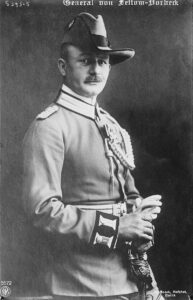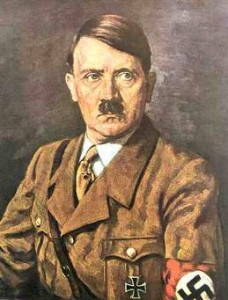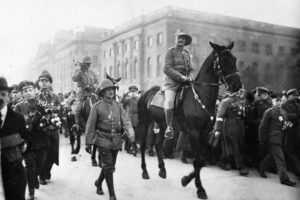
 Japan entered World War I as a member of the Allies on August 23, 1914. Assisting the Allies with the war effort was not their reason for doing so, however. Once in, Japan seized the opportunity of Imperial Germany’s distraction with the European War to expand its sphere of influence in China and the Pacific. Because Japan already had a military alliance with Britain, there was minimal fighting as they pushed through to make their territorial gains. Japan was not pressured to enter the war. The Allies had things well in hand, so their motive was obvious. As they swept through, they quickly acquired Germany’s scattered small holdings in the Pacific and on the coast of China. While those holdings were relatively easy to overtake, not all of Germany’s holdings were so easy.
Japan entered World War I as a member of the Allies on August 23, 1914. Assisting the Allies with the war effort was not their reason for doing so, however. Once in, Japan seized the opportunity of Imperial Germany’s distraction with the European War to expand its sphere of influence in China and the Pacific. Because Japan already had a military alliance with Britain, there was minimal fighting as they pushed through to make their territorial gains. Japan was not pressured to enter the war. The Allies had things well in hand, so their motive was obvious. As they swept through, they quickly acquired Germany’s scattered small holdings in the Pacific and on the coast of China. While those holdings were relatively easy to overtake, not all of Germany’s holdings were so easy.
In fact, the other Allies quickly started to realize that Japan’s motives weren’t exactly in everyone’s best interests, and they began to push back hard against Japan’s efforts to dominate China through the Twenty-One Demands of 1915. Japan’s occupation of Siberia against the Bolsheviks failed, as its wartime diplomacy and limited military action produced few results. Then, by the time of the Paris Peace Conference in 1919, Japan was largely frustrated in its ambitions. Nevertheless, Japan had snapped up Germany’s Asian colonies with ease, and even the African colony of Togoland (now Togo and parts of Ghana) fell in less than three weeks. The first real sign of resistance was when German Kamerun (Cameroon) was invaded and lightly contested until 1916. Still, it fell in the end. It seemed that Japan was undefeatable.
Nevertheless, with all the victories, the German colonies in East Africa led by the formidable and undefeated Paul von Lettow-Vorbeck proved to be the exception to the rule. The situation facing von Lettow-Vorbeck and his colonial forces was formidable. Still, von Lettow-Vorbeck knew how to fight, and he refused to back down. When the Japanese came up against von Lettow-Vorbeck, they found themselves heavily outnumbered, and they found themselves with no prospect of reinforcements or much in the way of material support arriving anytime soon.
The fact was that von Lettow-Vorbeck was seeking to tie up British military resources in Africa to relieve some pressure on the European theater. He drew upon his many years of service in Africa to wage a highly effective guerilla war against a much larger enemy. Von Lettow-Vorbeck was probably one of the greatest guerilla warfare strategists of all time…maybe the greatest. Von Lettow-Vorbeck even gained the loyalty of his African soldiers. In those days, it was highly unusual for a commanding officer or any white soldier for that matter, to show any level of respect to the African soldiers. Von Lettow-Vorbeck did, by appointing Black officers and speaking Swahili. The German troops had learned to live off the land and make the most of very little supplies, due to hard lessons drawn from years of colonial warfare in Africa. Those years were filled with atrocities, but they had persevered.
This one small German colonial army tied up the British forces for the duration of the conflict. The British had been plundering food  supplies that devastated the local population. Finally, the German army surrendered on November 25, 1918, in Zambia, two weeks after the November 11, 1918 armistice ended hostilities. Of course, Hitler knew a great officer when he saw one, and so after the war, Hitler immediately offered von Lettow-Vorbek a prestigious position in the Third Reich. In what most would consider a complete shock, von Lettow-Vorbeck bluntly refused the offer, using some very “colorful” language, which shall not be repeated here. It was a courageous, but not very wise move, given the circumstances. Nevertheless, his boldness, as well as his loyalty to the German people, paid off. Von Lettow-Vorbeck was simply too popular with the German people to be eliminated by the regime. He lived to be 94.
supplies that devastated the local population. Finally, the German army surrendered on November 25, 1918, in Zambia, two weeks after the November 11, 1918 armistice ended hostilities. Of course, Hitler knew a great officer when he saw one, and so after the war, Hitler immediately offered von Lettow-Vorbek a prestigious position in the Third Reich. In what most would consider a complete shock, von Lettow-Vorbeck bluntly refused the offer, using some very “colorful” language, which shall not be repeated here. It was a courageous, but not very wise move, given the circumstances. Nevertheless, his boldness, as well as his loyalty to the German people, paid off. Von Lettow-Vorbeck was simply too popular with the German people to be eliminated by the regime. He lived to be 94.


Leave a Reply